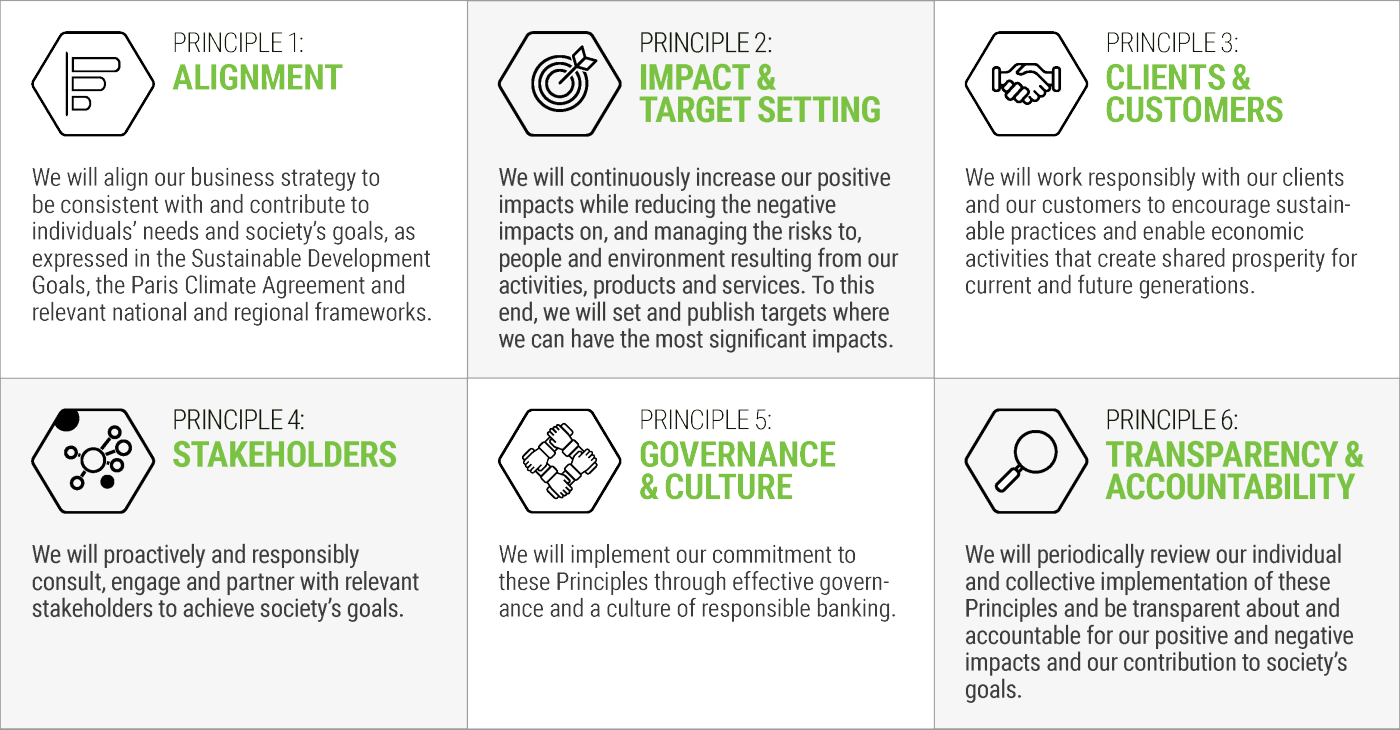
UNEP selects RBI as a Global Case Study for “good practice” in Responsible Banking
In 2021, we signed the Principles for Responsible Banking. By committing to six principles, we anchor sustainability in our strategy and portfolio. We’re honored to be selected as one of three global case studies by the UNEP Finance Initiative as an example of “good practice”. Learn more about our efforts.
As a long-standing member of the UNEP Finance Initiative, we signed the Principles for Responsible Banking (PRB) in 2021, thereby committing to implement the six associated principles within the Group.
Why we were eager to sign these principles
The six principles anchor sustainability at a strategic and portfolio level in all areas of business by supporting our clients in their own sustainable transition path. Thus, we are underlining our efforts to proactively contribute to the implementation of the Paris goals and the redirection of capital flows to sustainable activities.
Sustainability is one of our four strategic pillars, alongside growth, digital transformation, and cost discipline. This aims to help us realize our Vision of 2025: “We are the most recommended financial services group”. The Principles of Responsible Banking lead to a holistic approach integrated in the Group. Since singing the PRBs, we have launched a long-term plan to integrate sustainability even more strongly into our business strategies, into policies, the bank’s steering mechanism, our client engagement, the product universe, our active stakeholder cooperations, the internal ESG governance and RBI’s ESG academy as well as also into an annual progress reporting.
As one of the first important PRB milestones, we initially demonstrated our commitment by conducting an impact analysis of our portfolio according to Sustainable Development Goals and relevant ESG impact areas. Our pivotal role as a bank means that our activities and business relationships impact the economy, the environment and society, including human rights. Only if we know the impacts of our business activities, can we pursue a serious policy of sustainability and align the company strategy with this goal. The sustainability impact was analyzed for our portfolio using the UNEP FI Portfolio Impact Analysis Tool to have a scientific look at our positive and negative impact.
The material negative impact areas in terms of the biggest share of our exposure that has an impact are in the two fields of “climate change” and “circularity”. The latter field encompasses the impact themes of resource efficiency and waste management. For both fields, specific measures have been taken to counteract.
For the impact area “climate change”:
- We have set a well-below 2°-target (target degree 2040) and know our sector-specific emission intensities
- Our Science Based Targets were officially approved in September 2022 and represent an important tool steering towards financing activities that are compatible with the Paris Agreement goals and are based on the well-recognized PCAF methodology (Partnership for Carbon Accounting Financials).
- We plan to rely on the sectoral strategies developed to manage the structure of our loan portfolio and the exposure of our customers to its funded emission targets
- There are three main categories as a basis for our sectoral policies:
1) Exclusionary (full or partial exclusion of sectors or customers)
2) Transformative (supporting sectors and customers on their journey to reduce carbon emissions)
3) Supportive (for sectors and companies that are already in the green and socially just economy of the future) - Sector group guidelines for steel, oil & gas and real estate & construction have been progressed
- We have defined our approach to tobacco, war materials and gambling in a special directive
For the impact area “circularity”:
- We are an active member of UNEP FI’s working group on “PRB Resource Efficiency and Circular Economy Target Setting” and have started our research on the topic with the help of RBI’s employee talent program
- The topic was included in the internal environmental score as well as the environmental questionnaire of the customers in order to be able to set quantitative targets based on the data situation
It is a great honor that RBI was even selected as one of three global case studies by the UNEP Finance Initiative as an example of “good practice”. These case studies serve as an inspiration and to provide practical insights for other banks.
But what are the six principles actually about
The six principles of the Principles for Responsible Banking consist of the following:

Here’s a deep dive into each principle:
Principle 1: Alignment
We will align our business strategy to be consistent with and contribute to individuals’ needs and society’s goals, as expressed in the Sustainable Development Goals, the Paris Climate Agreement and relevant national and regional frameworks.
Principle 2: Impact & target setting
We will continuously increase our positive impacts while reducing the negative impacts on, and managing the risks to, people and the environment resulting from our activities, products and services. To this end, we will focus our efforts on areas in which we can have the most significant impacts and set corresponding targets.
Principle 3: Clients & customers
We will work responsibly with our clients to encourage sustainable practices and enable economic activities that create shared prosperity for current and future generations
Principle 4: Stakeholders
We will proactively and responsibly consult, engage and partner with relevant stakeholders to achieve society’s goals
Principle 5: Governance & culture
We will implement our commitment to the Principles through effective governance and a culture of responsible banking
Principle 6: Transparency & accountability
We will periodically review our individual and collective implementation of these principles and be transparent about and accountable for our positive and negative impacts and our contribution to society’s goals.
Related News
Be the first
Subscribe to Raiffeisen Insights. Get an e-mail with
the latest trends in the world of economics and business.